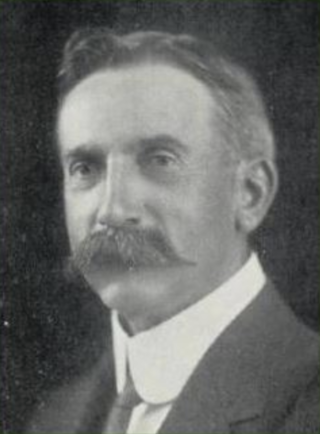Related Research Articles

Norman Kirkwood Ewing, Australian politician, was a member of three parliaments: the Western Australian Legislative Assembly, the Australian Senate, and the Tasmanian House of Assembly. He became a Judge of the Supreme Court of Tasmania, and was Administrator of Tasmania from November 1923 to June 1924.

George Mason Burns was an Australian politician. He was an Australian Labor Party member of the Australian House of Representatives from 1913 to 1917, representing the electorate of Illawarra. He had previously been a member of the Tasmanian House of Assembly from 1903 to 1906.

James Ernest Ogden was an Australian politician who was elected to the Tasmanian House of Assembly and the Australian Senate.

Charles Ernest Culley CMG was an Australian politician. He was a member of the Australian Labor Party (ALP) and served in the Australian House of Representatives (1928–1931) and Tasmanian House of Assembly (1934–1948). He was an assistant minister in the federal Scullin government and later became a minister in the Tasmanian state government.

Charles Richard Howroyd was an Australian politician. He was a member of the Tasmanian House of Assembly from 1909 until 1917, representing the Australian Labor Party until leaving the party in the 1916 Labor split. He was then elected to the Australian House of Representatives at the 1917 federal election, but died only five days later.

Joshua Thomas Hoskins Whitsitt was an Australian politician. He was a member of the Tasmanian House of Assembly from 1909 to 1922 and a member of the Australian House of Representatives from 1922 to 1925.
The Electoral district of Queenstown was a single-member electoral district of the Tasmanian House of Assembly.
William Henry Thomas Brown was an Australian politician and sailor. He was a member of the Tasmanian House of Assembly from 1882 to 1889 and from 1893 to 1893, both times representing the electorate of Campbell Town.
James Joseph Gaffney was an Australian politician. He was a member of the Tasmanian House of Assembly from 1899 to 1903, representing the electorate of Lyell.
Alfred Youl was an Australian politician. He was a member of the Tasmanian House of Assembly for Longford from 1903 to 1909 and a member of the Tasmanian Legislative Council for Macquarie from 1909 to 1920.
Sir Herbert Nicholls was an Australian judge and politician, who was Chief Justice of Tasmania from 1914 to 1937, and as an independent member of the Tasmanian House of Assembly from 1900 to 1909. In parliament, he served as Attorney-General and Leader of the Opposition.
William Aikenhead was an Australian politician, who was a member of the Tasmanian House of Assembly from 1898 until his death in office in 1902.
William Percival Brownell was an Australian politician. He was a member of the Tasmanian House of Assembly from 1903 to 1909, representing the electorate of Franklin.
Charles John Mackenzie was an Australian politician. He was a member of the Tasmanian House of Assembly from 1886 to 1909, representing the electorate of Wellington.
George Edward Brettingham-Moore was an Australian state and local politician. He was a member of the Tasmanian House of Assembly from 1903 to 1909, representing the electorate of West Hobart. He was elected an alderman of the Hobart City Council for the period 1902 to 1904.
John Blackler Gibson was an Australian politician. He was a member of the Tasmanian House of Assembly from 1903 to 1906, representing the electorate of North Esk.
The Tasmanian Labor Party, officially known as the Australian Labor Party (Tasmanian Branch) and commonly referred to simply as Tasmanian Labor, is the Tasmanian branch of the Australian Labor Party. It has been one of the most successful state Labor parties in Australia in terms of electoral success.
Matthew Edward Robinson was an Australian politician. He was a member of the Tasmanian House of Assembly from 1903 to 1906.
Carmichael Lyne was an Australian politician. He was a member of the Tasmanian House of Assembly from 1900 to 1906, representing the seat of Ringarooma.
Thomas William Massey was an Australian politician. He was a member of the Tasmanian House of Assembly from June 1902 to April 1903, representing the electorate of Selby.
References
- 1 2 3 "Charles Winnett Allen". Members of the Parliament of Tasmania . Retrieved 23 July 2022.
- 1 2 "Obituary". The Examiner . 27 October 1913. p. 5. Retrieved 14 April 2018– via Trove.
- ↑ "Westbury". The Examiner . 28 January 1903. p. 5. Retrieved 14 April 2018– via Trove.
- ↑ "Westbury Council". The Examiner . 3 June 1903. p. 7. Retrieved 14 April 2018– via Trove.
- ↑ "General elections in Tasmania". Leader . 11 April 1903. p. 24. Retrieved 14 April 2018– via Trove.
- ↑ "Mr C. W. Allen at Westbury". The Daily Telegraph . 16 March 1903. p. 5. Retrieved 14 April 2018– via Trove.
- ↑ "State politics". The Examiner . 30 January 1906. p. 5 (DAILY.). Retrieved 14 April 2018– via Trove.
- ↑ "Westbury". The Mercury . 5 April 1906. p. 7. Retrieved 14 April 2018– via Trove.
- ↑ "The State Elections". The North Western Advocate and the Emu Bay Times . 20 February 1909. p. 5. Retrieved 14 April 2018– via Trove.
- ↑ "Legislative Council Elections". The Daily Telegraph . 13 March 1909. p. 6. Retrieved 14 April 2018– via Trove.
- ↑ "News in brief". The Ballarat Star . 28 October 1913. p. 6. Retrieved 14 April 2018– via Trove.
- ↑ "Death of an old resident". Tasmanian News . 26 February 1908. p. 4. Retrieved 14 April 2018– via Trove.